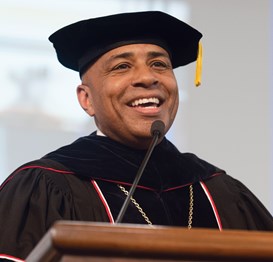Alumni Resources
About the University
Dr. Ronald S. Rochon speaks on the purpose and role of education in society.

In your opinion, what is the value of higher education?
It’s transformative for both the individuals pursuing an education and the communities they will one day serve.
For those seeking intellectual capital and upward mobility, the higher ed path offers the opportunity to discover who they are and what they want out of life by exposing them to new thoughts and new ways of doing. They, in turn, apply that knowledge to communities, both domestic and international. This is essential to the advancement of society and made possible through collaboration between institutions and communities.
The relationship between communities and higher education is symbiotic. What challenges does higher education face in terms of benefiting communities?
The main challenge is how to be accessible to all sectors of the population who are interested in earning a higher-education degree. Society wrestles with the ability to reach and uplift underserved segments of the population, but it is vital to the advancement and enrichment of society that all people have a voice in the sustainment and growth of their community.
It’s imperative that universities and colleges continue to work to develop pathways that make education not only more available, but also convenient for those who possess fewer resources.
What sets USI apart from other institutions?
We have an inviting campus with faculty of record who are deliberate and intentional in their engagement with students, as well as a caring and unique community both on and off campus. Our size allows us to get things done. It allows us to get to know the people who entrust us to deliver their educational needs.
What are the biggest challenges USI faces, and how is it responding?
Cost and enrollment. We are still one of the most affordable four-year universities in the state and region, but costs are always rising. Our role is to be trusted stewards of our resources and return a sound investment on them for those who partner with us. In doing so, our faculty and administrators must be responsive to the educational needs of society, otherwise enrollment will always suffer.
The ways in which people are seeking an education today differs from 20 years ago. Students have high expectations of what an education can deliver, and we must rise to meet those challenges and opportunities.
What is your greatest concern for higher education’s future?
The preconceived notion by some that only certain individuals are deserving of this opportunity. Education is for everyone. Higher education is where we start to grow into the best we can be.
I come from a home where my mom and dad were 17 and 18 years old, respectively, when I was born. A lot of people don’t expect the kid of teenagers to go to college, but we need to afford that opportunity to everyone who wants it.
If society develops an elitist attitude toward education, with predetermined factors of who should or should not attend college, it could lead to homogenized classes when what we need most is diversity.
People with different experiences, different viewpoints and different solutions to societal issues, problems and needs are necessary.
School Picture

Attending St. Ailbe Catholic Elementary School in Chicago, Dr. Rochon walked to school, wore a uniform and ate many lunches in the school cafeteria, but sometimes his mother packed his lunch. His favorite sandwich was a bacon sandwich.
To get to high school at Chicago Willibrord Catholic High School (home of the Warriors) he had to catch two Chicago Transit Authority buses and then walk the rest of the way. Notably a shy teen, he ran for class president his senior year and won. His favorite teacher was Mrs. Jefferson. “She made me feel like I could learn science.”
Away from home at Tuskegee University in Alabama, he earned a bachelor’s degree in animal science, became president of his fraternity, Omega Psi Phi, and lived in Residence Hall C, Room 110.
While pursuing a master's and doctorate at University of Illinois, he had two pet snakes—a ball python named Amadeus and a reticulated python named Omega—and appeared on the children’s show “3-2-1 Contact,” educating kids about the digestion system using a pig. To view the video, click below and scroll to the 7:40 minute mark.